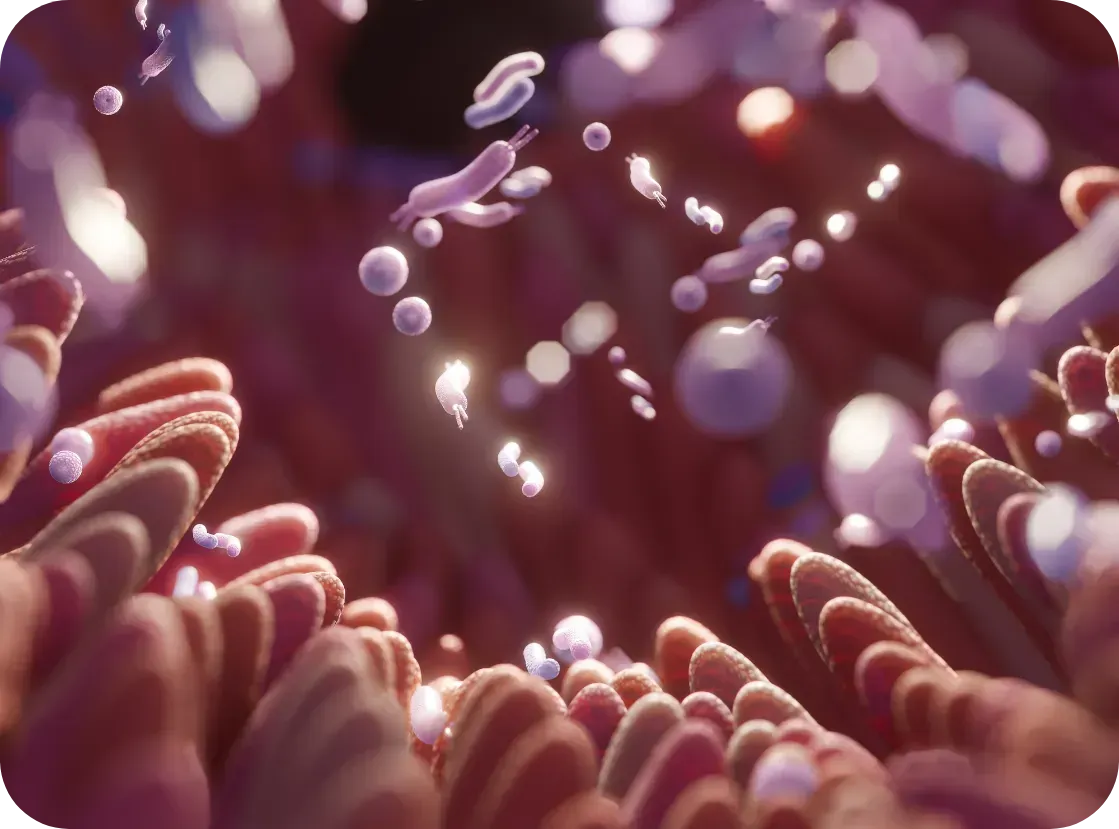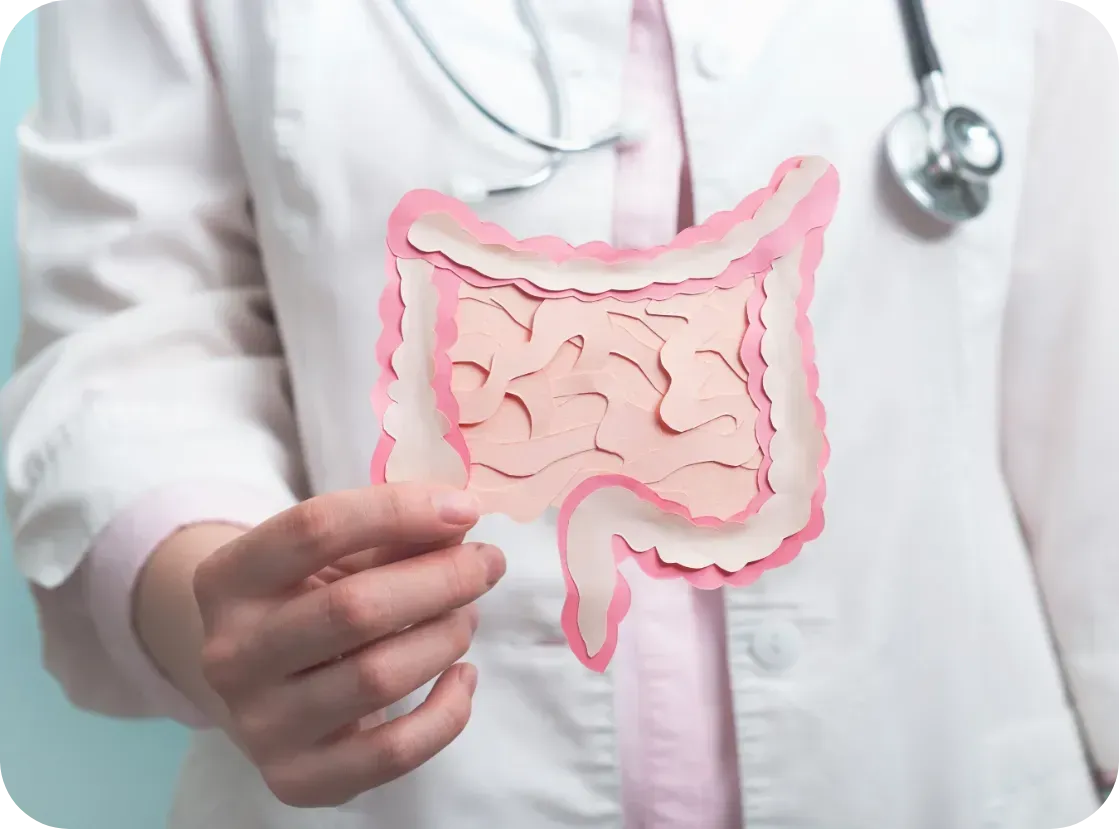GUT FEELINGS: The Hidden Link Between Gut Health and Hormonal Imbalance
By Our Daughters Foundation
GUT FEELINGS: The Hidden Link Between Gut Health and Hormonal Imbalance
By Our Daughters Foundation
1. The Gut Microbiome: Your Internal Ecosystem
Your gut isn’t just a tube for digesting food. It’s home to trillions of bacteria that:
• Help break down food
• Make key nutrients (like B vitamins)
• Train your immune system
• And — importantly — regulate estrogen levels
This bacterial community is called the gut microbiome, and when it’s healthy and diverse, it supports balanced hormones. But when the microbiome is out of balance — a condition called dysbiosis — problems can arise.

2. Estrobolome: The Gut’s Hormone Filte
Inside the gut, a specific group of bacteria known as the estrobolome helps process estrogen. These bacteria produce enzymes (like beta-glucuronidase) that influence how much estrogen is reabsorbed into the bloodstream versus excreted.
When the estrobolome is overactive or underactive, it can lead to:
• Excess circulating estrogen → linked to endometriosis, fibroids, PMS, and breast tendernes
• Too little estrogen → contributing to mood changes, bone loss, and vaginal dryness
So a disrupted gut can directly amplify hormonal imbalances.
3. Inflammation: The Common Denominator
Both gut dysbiosis and endometriosis are associated with chronic inflammation. When the gut barrier is weakened (a condition sometimes called “leaky gut”), it allows inflammatory molecules to pass into the bloodstream. This triggers an immune response — and in people with endometriosis or PCOS, it can worsen pelvic pain, fatigue, and hormonal chaos.

4. What the Research Says
While this field is still developing, early studies have found:
• Women with endometriosis often have altered gut microbiomes compared to those without the condition. [Study: Ata et al., 2019, Scientific Reports]
• A high-fiber, plant-rich diet may help support a more balanced gut flora and improve estrogen metabolism. [Study: Fuhrman et al., 2004, Journal of Nutrition]
• Some researchers are exploring probiotic therapy as a future tool for managing hormone-related conditions.
5. What Can You Do?
You can’t fully control your hormones — but you can support your gut.
Here are some gut-friendly, hormone-supporting habits:
• Eat more fiber: vegetables, fruits, legumes, and seeds
• Avoid excessive sugar and processed foods
• Include fermented foods: yogurt, kefir, sauerkraut, kimchi
• Consider a probiotic — talk to your provider first
• Manage stress — cortisol (the stress hormone) also affects gut balance
• Support liver detoxification (which works with your gut to clear estrogen): eat cruciferous vegetables like broccoli and cauliflower

Final Thoughts
The gut isn’t just about digestion — it’s a key player in how your body handles hormones, pain, and inflammation.
If you’re struggling with endometriosis, PCOS, or unexplained hormone symptoms, supporting your gut might be an empowering place to start.
Want to Learn More?
Here are some helpful articles and research:
• The Gut Microbiome and Estrogen Metabolism – NIH
https://www.ncbi.nlm.nih.gov/pmc/articles/PMC6471213/
• Gut Microbiota and Endometriosis – Scientific Reports
https://www.nature.com/articles/s41598-019-39645-2
• How the Gut Influences Hormones – Integrative Medicine Journal
1. The Gut Microbiome: Your Internal Ecosystem
Your gut isn’t just a tube for digesting food. It’s home to trillions of bacteria that:
• Help break down food
• Make key nutrients (like B vitamins)
• Train your immune system
• And — importantly — regulate estrogen levels
This bacterial community is called the gut microbiome, and when it’s healthy and diverse, it supports balanced hormones. But when the microbiome is out of balance — a condition called dysbiosis — problems can arise.

2. Estrobolome: The Gut’s Hormone Filte
Inside the gut, a specific group of bacteria known as the estrobolome helps process estrogen. These bacteria produce enzymes (like beta-glucuronidase) that influence how much estrogen is reabsorbed into the bloodstream versus excreted.
When the estrobolome is overactive or underactive, it can lead to:
• Excess circulating estrogen → linked to endometriosis, fibroids, PMS, and breast tendernes
• Too little estrogen → contributing to mood changes, bone loss, and vaginal dryness
So a disrupted gut can directly amplify hormonal imbalances.
3. Inflammation: The Common Denominator
Both gut dysbiosis and endometriosis are associated with chronic inflammation. When the gut barrier is weakened (a condition sometimes called “leaky gut”), it allows inflammatory molecules to pass into the bloodstream. This triggers an immune response — and in people with endometriosis or PCOS, it can worsen pelvic pain, fatigue, and hormonal chaos.

4. What the Research Says
While this field is still developing, early studies have found:
• Women with endometriosis often have altered gut microbiomes compared to those without the condition. [Study: Ata et al., 2019, Scientific Reports]
• A high-fiber, plant-rich diet may help support a more balanced gut flora and improve estrogen metabolism. [Study: Fuhrman et al., 2004, Journal of Nutrition]
• Some researchers are exploring probiotic therapy as a future tool for managing hormone-related conditions.
5. What Can You Do?
You can’t fully control your hormones — but you can support your gut.
Here are some gut-friendly, hormone-supporting habits:
• Eat more fiber: vegetables, fruits, legumes, and seeds
• Avoid excessive sugar and processed foods
• Include fermented foods: yogurt, kefir, sauerkraut, kimchi
• Consider a probiotic — talk to your provider first
• Manage stress — cortisol (the stress hormone) also affects gut balance
• Support liver detoxification (which works with your gut to clear estrogen): eat cruciferous vegetables like broccoli and cauliflower

Final Thoughts
The gut isn’t just about digestion — it’s a key player in how your body handles hormones, pain, and inflammation.
If you’re struggling with endometriosis, PCOS, or unexplained hormone symptoms, supporting your gut might be an empowering place to start.
Want to Learn More?
Here are some helpful articles and research:
• The Gut Microbiome and Estrogen Metabolism – NIH
https://www.ncbi.nlm.nih.gov/pmc/articles/PMC6471213/
• Gut Microbiota and Endometriosis – Scientific Reports
https://www.nature.com/articles/s41598-019-39645-2
• How the Gut Influences Hormones – Integrative Medicine Journal
Join Us: Make a Difference Today
Your support can transform lives. Every donation helps us fund research, advocate for better care, and provide essential grants to women facing debilitating conditions.
Join Us: Make a Difference Today
Your support can transform lives. Every donation helps us fund research, advocate for better care, and provide essential grants to women facing debilitating conditions.

Endometriosis: A Cancer-Mimicking Disease
A recent article published in the Annals of Research in Oncology (Vol. 5 June 2025) looks at the similarities between the behavior of some cancers and endometriosis. The article states, "Endometriosis, defined by the presence of endometrial-like tissue beyond the uterine cavity, afflicts over 190 million young women worldwide and often significantly reduces quality of life. Despite being historically classified as a benign gynecologic disorder, endometriosis can mimic cancer in imaging findings, serum tumor markers, and molecular signature." The article urges a different approach to the disease due to the fact that the current approach takes so long to diagnose (8-10 years on average) and leads many women down the path of repeated surgeries and hormone therapy that does little to treat the disease. The impact statement of the article urges a different approach altogether, "This perspective advocates a structured translational approach, integrating meticulous preclinical validation, phase-appropriate clinical trials, and rigorous safeguards in artificial intelligence and biomarker development, to bridge critical gaps in understanding disease biology."
We have summarized the points of the article below and also put the link to the full article. We fully believe that it is time for a different approach and are looking for opportunities to support research that is happening in the study of Endometriosis. Please join us in raising awareness and making some noise on the topic.
Summary of Article (in an oversimplified manner):
Why Endometriosis Acts Like Cancer
It spreads like cancer.
It can grow into nearby organs and even travel around the body—just like cancer does. It invades nearby tissue and can spread to just about any place in the body including the brain, the tissue in your legs, lymph nodes...they have found it just about everywhere.
It tricks doctors.
On scans and in lab tests, it looks just like cancer, so people sometimes get misdiagnosed. Even trickier, more often than not, Endometriosis lesions are not detectable on imaging which means that a diagnostic laparoscopic surgery is needed for diagnosis. Imagine how long that prolongs diagnosis and how often the diagnostic surgery is not covered by insurance. Even worse, how often women are told that "all is normal" because nothing was detected on imaging.
It won’t stop growing.
The tissue doesn’t follow normal rules—it keeps growing even when it’s not supposed to. Healthy cells know when to stop growing. Endometriosis doesn't. It uses the same tricks that cancer cells do to stay alive and keep growing.
It builds its own blood supply.
Like cancer, it tells the body to grow new blood vessels to feed it. The article gets into more specifics by explaining that endometriosis uses high levels of VEGF, MIF, and prostaglandins to build blood vessels - a hallmark of tumor growth.
It hides from the immune system.
It finds ways to stay safe, so the body doesn’t attack it—just like some cancer cells.
It has messed-up signals.
Inside the cells, the “messages” that tell cells when to grow or die are broken. These are the same bad messages found in cancer cells.
What These Doctors Are Saying:
Endometriosis has many of the same cell problems that cancer does.
Some women with endometriosis have a higher risk of getting a certain kind of ovarian cancer.
Doctors think we should study and treat it more like cancer, using:
Special medicines that stop growth
Tests to find it earlier
Research on how to stop it from coming back
